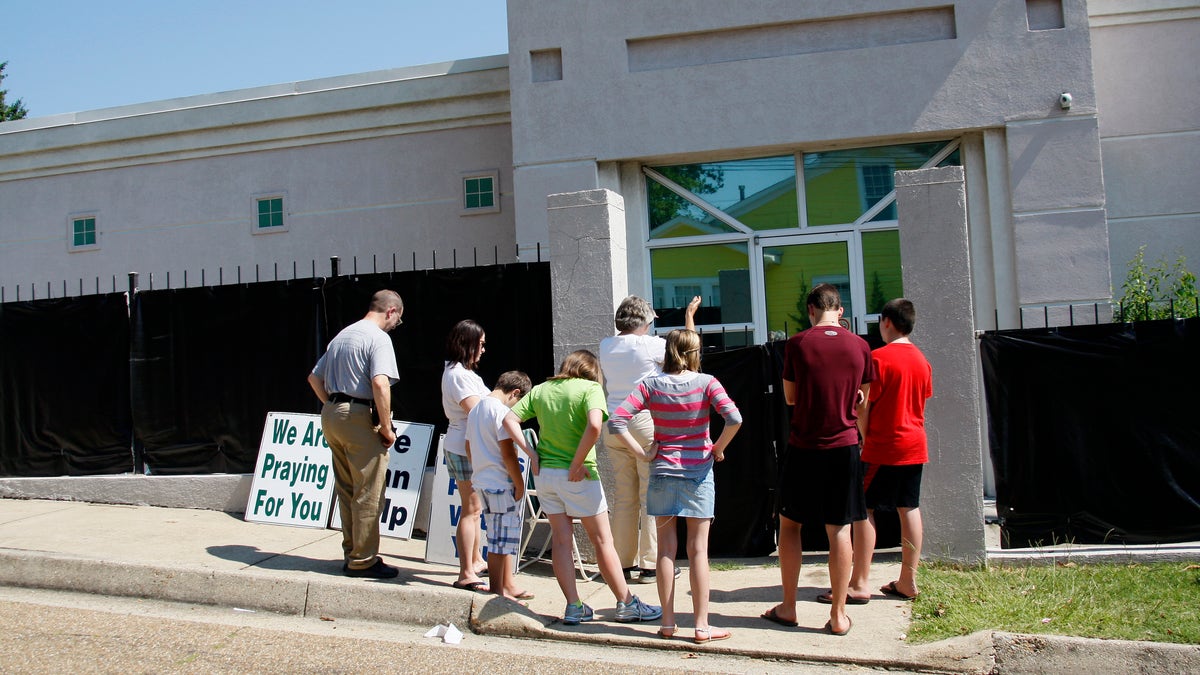
June 27, 2012: In this photograph, anti-abortion advocates stand outside Mississippi's only abortion clinic, singing and praying for their patients, and "counseling" them to reject abortion. (AP)
JACKSON, Miss. – A federal judge on Friday allowed Mississippi's anti-abortion law to take effect but said the state's only clinic can remain open and will not face any penalties as it tries to comply with new requirements.
U.S. District Judge Daniel P. Jordan III gave the clinic and the state each a partial victory with his ruling on the clinic's request for a preliminary injunction. The law requires anyone who does abortions at the clinic to be an OB-GYN with privileges to admit patients to a local hospital. The clinic's two out-of-state OB-GYNS don't have those privileges and have had difficulty getting them from local hospitals.
The ruling gives the clinic time to seek the privileges during the next several months. Jordan wrote that the dispute over the law is a "fluid situation."
"We do not yet know whether the clinic will obtain admitting and staff privileges," the judge wrote. "As both parties stated during the hearing, the resolution of that issue will impact the ultimate issues in this case."
The clinic, Jackson Women's Health Organization, has said it could be forced out of business with the admitting privileges requirement, making it nearly impossible to get an abortion in Mississippi.
The U.S. Supreme Court has ruled states can't place undue burdens on, or create substantial obstacles to, women seeking abortions.
The clinic said its OB-GYNs have applied for admitting privileges at most Jackson-area hospitals but haven't received responses. When clinic employees called a Catholic hospital to ask about applying for privileges, clinic owner Diane Derzis recently said, "We were told not to bother."
The clinic sued the state June 27 seeking to block the law. Jordan temporarily blocked the measure July 1, the day it was supposed to take effect. He heard arguments Wednesday about the clinic's request for a longer injunction, and granted the request in part on Friday.
"The act will be allowed to take effect, but plaintiffs will not be subject to the risk of criminal or civil penalties at this time or in the future for operating without the relevant privileges," the judge wrote.
Jordan noted that during Wednesday's hearing, clinic attorneys said the facility would continue to seek hospital admitting privileges. He wrote that he blocked penalties because the clinic had shown it would face "irreparable injury" if criminal prosecution or civil penalties were possible if the clinic didn't obtain the privileges quickly.
"Given the highly charged political context of this case and the ambiguity still present, the court finds that there would be a chilling effect on the plaintiffs' willingness to continue operating the clinic until they obtained necessary privileges," he wrote.
Supporters of the law passed by the GOP-controlled Legislature this year said it's designed to protect patients, and Republican Gov. Phil Bryant has said he hopes it will help make Mississippi "abortion-free."
Bryant said Friday he was "gratified" that the judge will allow the law to start taking effect.
"Mississippi will continue to defend this important measure as the legal process moves forward," Bryant said in a news release.
Republican Rep. Sam Mims, who sponsored the law, said he's also pleased Jordan allowed the law to take effect.
"I am confident that the new legislation will result in the improvement of health care for women," Mims said.
The state health officer, Dr. Mary Currier, filed a sworn statement in federal court Thursday showing how long it would take to fully implement the law if it takes effect. If the clinic is inspected and found out of compliance, it would get about 10 months to try to follow the mandates and to exhaust its administrative appeals with the Health Department. If the clinic loses its state license, it would then get more time to appeal to a state court.
Health Department spokeswoman Liz Sharlot said Currier and other department officials late Friday were reviewing the judge's decision to see what the agency's next steps will be.
The clinic says its physicians perform almost all of the roughly 2,000 abortions that are performed in Mississippi each year. If Mississippi physicians perform 10 or fewer abortions a month, or 100 or fewer a year, they can avoid having their offices regulated as abortion facilities.
A spokeswoman for Pro-Life Mississippi, Tanya Britton, said Friday of the judge's ruling that keeps the clinic open for now: "It's not a victory for the women of the state of Mississippi. This law was always about their health. If a woman is going to have an abortion and if people who perform abortions say they really care about the health of women, then they should want the best standard of care."
The New York-based Center for Reproductive Rights, which has been helping the clinic in the lawsuit, says it has no plans to appeal.
"The federal judge has provided crucial temporary protection for the clinic and its physicians," Nancy Northup, the center's president and CEO, said in a news release. "We will remain vigilant in our fight to ensure the clinic isn't subject to penalties that would force its doors to close and deprive Mississippi women of their constitutionally-protected rights."

